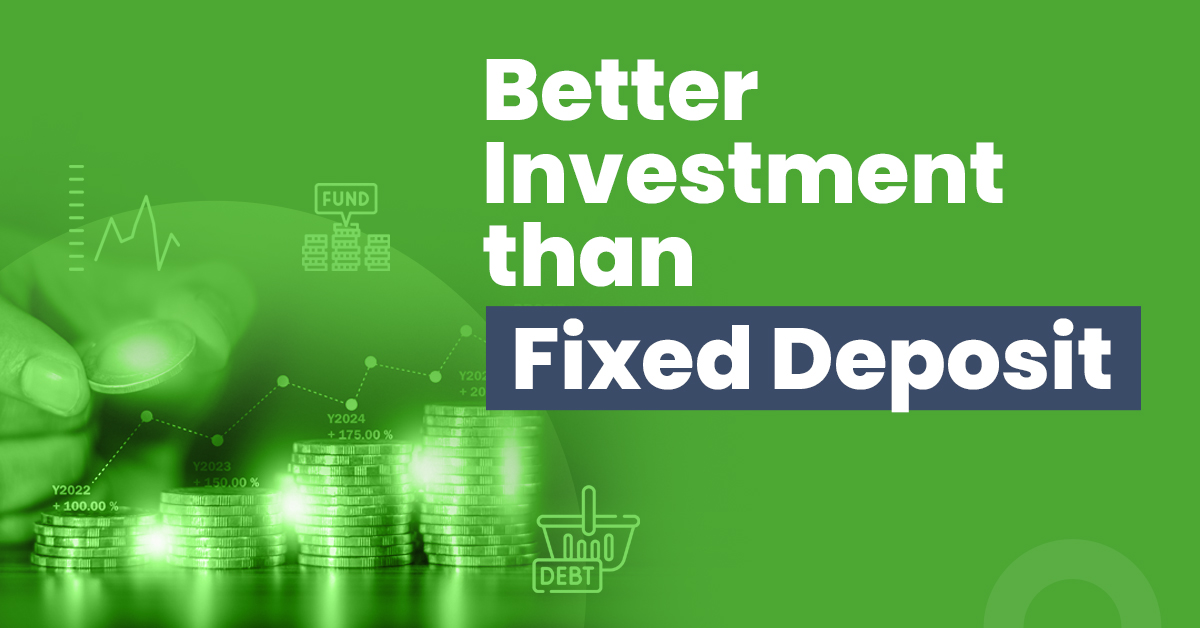5 Investment Options to Earn Better Returns than Bank FD


Fixed deposits are one of the most popular investment options in India. One of the reasons for its popularity is the low risk associated with the investment. The fixed interest rate makes investment planning easier.
FDs’ drawback is that the returns may only beat inflation. Your investment will lose value if the FD interest rates stay below the inflation rate. This could be a problem in the long term.
But if FD, the favourite option for many, is not beneficial, what are the alternatives? Let us look at better investments than FD, which can offer high potential returns.
Also Read: Experience financial growth with unmatched Bajaj Finance FD Rates
Investment Options that are Better than FDs
It takes work to measure how beneficial an investment option is. The results may even vary according to the attribute you use to compare the same. But in this case, let us take returns as the measuring scale. Below are five better investment options than FDs in that aspect:
1) Bond Investments
If you are a conservative investor and that is the reason you choose FDs, bond investments are something you can consider. Bonds are debt instruments. Governments and corporations usually issue bonds to raise money.
Bonds can be considered as a loan to the entity. The amount you pay to buy bonds is the amount you lend to the company or government that issues the bond. For the money you have lent, you will receive a fixed interest until the end of the bond’s tenure. And at maturity, you will receive the face value back, which is equal to the amount you initially invested.
Here, the factor that gives bond investment the edge is its interest rates. They are usually on the higher side compared to FDs, and they tend to beat inflation.
Bond investments also have higher liquidity than FDs. FDs have a lock-in period, and if you want to withdraw your investment before that, you may have to pay a penalty. But bonds are tradable in the secondary market, making them much more liquid. However, there are other factors as well which need to be considered to determine the liquidity.
2) Stock Market Investments
Stock market investments are known to have the highest growth potential. Nifty, the index that tracks the biggest companies in India, has grown over 65% in the last five years, as of 2022.
This means if you had invested in the index, your corpus would have grown by over 65%. The index also reflects the overall performance of the stock market in India. These factors make stocks a better investment when it comes to their return potential.
But at the same time, stock investments tend to have higher risks as well. This is because stocks are known to have higher volatility.
Another problem with stock market investments is the level of market expertise it demands. You may need to have a higher level of understanding of stock markets to be able to pick the right stocks according to your investment goals and risk appetite.
You may also need to monitor the stocks regularly to ensure that your portfolio is operating according to your plans. These could be the drawbacks when compared to FDs.
Also Read: Post Office Fixed Deposit: Interest Rate, Tenure and More
3) Mutual Funds
As mentioned above, stock market investments are beneficial, but they come with higher risks and demand a lot of management. But mutual funds could be a possible solution to this problem. Instead of you picking the stocks and managing the portfolio, you could invest in professionally managed portfolios using mutual funds.
Mutual funds have experienced fund managers who design and manage the portfolio. Furthermore, mutual funds are not limited to stocks, and instead, they invest in a variety of assets, including debts, currency, commodities, etc.
Returns from a mutual fund largely depend on the performance of its underlying assets.. Funds that focus on equities normally have a higher return potential than those that focus on debt.
But even debt mutual funds tend to have better returns than fixed deposits, making mutual funds a better investment option than FDs when it comes to their return potential. At the same time, the drawbacks include higher risks compared to FDs and charges associated with mutual funds.
Also Read: Best Investment Plan for Monthly Income
4) National Pension System (NPS)
Many people invest in FDs, intending to create a retirement fund. But unfortunately, FDs often fail to give considerable returns for the same. If you aim to create a retirement corpus, you can invest in NPS.
The National Pension Scheme is a government-backed retirement scheme encouraging people to build a retirement corpus. The plan has a maturity period till you turn 60, and it provides the flexibility of investment in small amounts at regular intervals to create a reasonable corpus in the long term.
In NPS, you can choose a portfolio to invest in. This includes market-linked instruments. This gives NPS a higher return potential than FDs. Depending on your choice of portfolio. The returns range somewhere between 9% to 12%.
A major downside is a lack of liquidity. Under normal circumstances, it is only possible to withdraw your fund from NPS after the end of maturity. But this should be fine if you are trying to build a retirement corpus.
Also Read: NSC vs FD: What are the Key Differences?
5) Corporate Fixed Deposits
Corporate fixed deposits are FD schemes offered by Non-Banking Financial Companies (NBFCs) and other financial institutions. They provide interest rates of around 7.05% to 7.50%, higher than normal bank FDs, often beating inflation.
But at the same time, since banks do not offer them, the risk of the investment is higher, and unlike bank FDs, they are not insured by DICGC. To ensure your corporate FD is a better investment than bank FDs, make sure you choose to invest in FDs offered by trusted institutions.
Also Read: 11 Common Myths about Credit Score
Final Thoughts
It is understandable why a low-risk investment option like an FD offered by trusted banks is a popular choice for people. But returns generated by FDs often fail to beat inflation. This can lead to negative real returns on your investments. Hence, considering the above options could be a wise choice, especially if your goals and risk appetite allow it.
FAQs
Where should I invest instead of FDs?
Below are a few options that are better investments than FDs when it comes to potential return:
> Bond investments
> Stock market investments
> Equity mutual funds
> Debt mutual funds
> National Pension System
> Senior Citizens’ Saving Scheme (SCSS)
> Pradhan Mantri Vaya Vandana Yojana (PMVVY)
Which is better, FD or MF?
Mutual funds tend to have a better potential for growth. This is because mutual funds generally have a market-linked portfolio. The presence of stock investments could ensure better returns than FDs in most cases. At the same time, mutual funds may come with a higher risk as well. Hence, it is better to take a call according to your investment horizon and risk appetite.
Can you lose money investing in bonds?
Bond investments are a much safer investment option when compared to stocks. But that doesn’t mean bonds come with zero risk. Although minimal, there are some risks. The biggest risk is of default. You can gauge this risk by looking at the credit ratings of the company as well as bonds. If you decide to trade your bonds, there could be a price risk similar to that of stocks. Hence, there is a chance of you losing money on bonds.
What are the types of bond investments?
There are two types of bonds you can choose from – government and corporate bonds. Government bonds are those that are issued by the government or government agencies, while corporate bonds are issued by different companies. They both have similar attributes, but government bonds come with negligible risk and thus lower returns compared to corporate bonds.
Is SIP better than FD?
SIP is not an investment option but a mode to invest in mutual funds through monthly instalments. Unlike FD, where you need a corpus to begin investing, SIP allows you to build a corpus with regular, smaller contributions.




